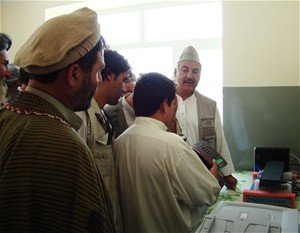
In the Deh Salah District Communications Network Center, the District Governor speaks by phone with the Provincial Governor in Puli Khumri.
USAID/Afghanistan
District Communications Network Centers link local officials and communities to other parts of Afghanistan and the world.
4 APRIL 2009 | PULI KHUMRI, AFGHANISTAN
Good governance is possible when citizens and elected officials have the opportunity to discuss local needs and government services on a regular basis. In a country like Afghanistan, poor roads, insufficient communications infrastructure, and security concerns hinder both direct and indirect exchanges. Bridging this gap in communications is essential to providing security and public services, as well as building trust between the government and its constituents.
Through an innovative USAID initiative, rural districts throughout Afghanistan are now receiving affordable telecommunications services for the first time through the construction of District Communications Network Centers (DCNs). These centers provide phone and internet services to both the local government and district residents.
Two-hundred and sixty eight DCNs throughout Afghanistan connect remote regions of the country with the central government in Kabul, provincial governments, and the rest of the world. Recently, the Government of the Islamic Republic of Afghanistan extended its reach to the troubled Andarab Valley in Baghlan Province with two new DCNs in the isolated districts of Deh Salah and Puli Hisar.
“A telephone line helps people, and most importantly the government, in stabilizing our district. I can call the provincial governor about the security situation and update him on a daily basis,” said Jan Agha Baghlani, a member of the Deh Salah District Development Association.
In addition to improving coordination between the district and provincial government, the DCNs also provide affordable communications services to community residents. For 20 cents per minute, citizens can make calls within Afghanistan. Internet service, which is increasingly important for students and businesspeople, is also available for two cents per minute.
The District Communication Network Centers in Baghlan were constructed by a private Afghan construction company, providing employment for local workers. The communications equipment and the full-time staff are provided by the Baghlan Department of Communications.







Comment
Make a general inquiry or suggest an improvement.